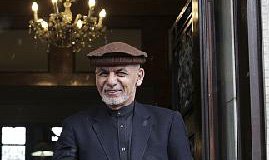ISLAMABAD -- The Islamic State militant group and the Taliban are competing to take credit for a spike in violence in Afghanistan over the past month, and analysts say both insurgent groups are growing in strength as security forces wither under their relentless attacks and a feuding government struggles to win over citizens.
Still, the two insurgent groups embrace different agendas and are at war with each other as well as the Afghan government, analysts say.
Recent large-scale attacks, which have included both suicide bombings and small arms fire, have left nearly 200 people dead and hundreds more wounded. Insurgents have targeted seemingly heavily secured areas in the heart of the Afghan capital, including an Afghan military academy on Monday and a hotel, owned by the government and frequented by foreigners, earlier this month.
On Tuesday, Afghanistan's dwindling prospects for peace took another downward turn with bellicose messages from both Afghan officials and Taliban leaders.
[THE ISLAMIC STATE: Timeline of group’s rise, fall; details on campaign to fight it]
"Believe me, I will take revenge," President Ashraf Ghani said after an evening prayer service in the capital. The country's enemies, he said, "should know that Afghans do not have a president who will give in."
In a separate formal statement, Ghani's chief spokesman said that by launching such horrific violence, "the Taliban has lost the opportunity for peace talks. From now on, peace must be sought on the battleground."
The Afghan leader's abrupt shift after months of calling for peace talks echoed remarks made by President Donald Trump in Washington on Monday, reacting to the series of deadly insurgent attacks.
"I don't think we're prepared to talk right now," the U.S. president told reporters in Washington on Monday before a White House meeting with United Nations Security Council members. "It's a whole different fight over there. They're killing people left and right. Innocent people are being killed left and right."
Using an ambulance to hide their deadly cargo, insurgents slipped passed checkpoints in Kabul's heavily fortified center on Saturday to kill more than 100 people. They also targeted an international aid organization in eastern Jalalabad and a Shiite cultural center in Kabul.
Afghan security forces seem powerless against the onslaught.
Insurgents share the same goal of delegitimizing the governments they are fighting against, said Andrew Wilder, vice president of Asia programs at the U.S. Institute of Peace. However, in Afghanistan, the similarity between the Islamic State and the Taliban ends there. Beyond toppling the Afghan government, the Islamic State affiliate and the Taliban have divergent goals, and where the Taliban have been seen as possible negotiation partners in a search for peace, the Islamic State has not.
The two groups have occasionally clashed on the battlefield.
"The Taliban and [the Islamic State] are clearly competitors in the Afghan arena," said Thomas Ruttig, whose Afghan Analysts network has deep knowledge of the country and has conducted nationwide studies into a myriad of issues confounding the country, including the Islamic State and Taliban.
"The Taliban I see as 'national Islamists' while the [Islamic State] is 'Internationalist,'" he said, dismissing reports of collaboration between the two insurgent groups, attributing them to rumors and bickering in northern Afghanistan within the Taliban.
Ruttig said Taliban fighters in northern Afghanistan recently flew the Islamic State flag after the Taliban leadership ordered them to hand over their tax collection revenue to the governing Taliban shura or council. A major source of revenue for the Taliban is the tax or tolls they charge residents for safe passage or to move legal as well as illegal commodities to market.
"The groups in the north are a separate phenomenon. There, Taliban commanders have switched to use [Islamic State] insignia, but the trigger was conflict over transferring taxes to the central leadership," Ruttig said.
While loosely constructed, the Taliban since the death of its supreme leader Mullah Mohammed Omar several years ago are mostly comprised of ethnic Pashtuns and Arab-speaking nationals with ties to al-Qaida.
The strongest fighting force within the Taliban is the Haqqani network, which has been blamed for the most audacious attacks in Kabul.
The Haqqani network has historical ties to Pakistan's powerful ISI spy agency, and both the United States and Afghanistan accuse Pakistan of providing sanctuary for Taliban fighters, a claim Islamabad denies. Pakistan in turn has blamed some of the most horrific attacks in Pakistan on Islamic State affiliate insurgents in Afghanistan, accusing Kabul of allowing them space to plot their attacks.
Meanwhile, the Islamic State affiliate known as Islamic State in Khorasan Province, named for the ancient region that once included Afghanistan, parts of Iran and Central Asia, is a toxic mix of disgruntled Taliban; Pakistani Taliban, who have sworn allegiance to the Islamic State against Pakistan; as well as Uzbeks, mostly from the Islamic Movement of Uzbekistan terror group.
The success of the U.S. and its allies in driving Islamic State fighters out of Iraq and Syria has pushed many toward Afghanistan, said Brian Glyn Williams, author of Counter Jihad, The American Military Experience in Afghanistan, Iraq and Syria.
Bolstering their ranks, he said, is Afghanistan's own Uzbek population living in northern Afghanistan, who have been drifting toward the Islamic State affiliate as a protracted feud between Ghani and his vice president, Uzbek warlord Gen. Abdul Rashid Dostum, deepens.
Information for this article was contributed by Kathy Gannon of The Associated Press and by Pamela Constable of The Washington Post.
A Section on 01/31/2018

